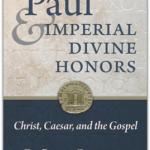In an old (1957) Church History article, George Huntston Williams explored the sacramental background to various atonement theories. Patristic theories ( Christus Victor in its various forms) he associates with baptism; Anselm with penitence and Eucharist.
Along the way he notes that Athanasius speaks of baptismal appropriation of the work of Christ as idiopoiesis , “making-one’s-own.” In my own study of Athanasius (Foundations of Theological Exegesis and Christian Spirituality) , I emphasize his use of idios , which is key to both his Trinitarian theology and his idea of incarnation. Fathers must have sons, and the eternal Father must have a Son who is equally eternal with Him, his very own Son ( idios ). When that Son takes on flesh, He makes humanity his own ( idios ); the weaknesses of flesh belong to the Son of God because He made them His own. Because of “appropriation,” Athanasius says, we can speak of the death of the Son of God.
But I missed what Williams points out – that the string of “one’s-own” relations continues into soteriology: In baptism, the baptized are quickened from death “by the appropriation ( idiopoiesis ) of his body . . . and by the grace of the resurrection.” Christ becomes the baptized person’s “own,” just as Christ made flesh “his own,” just as in the eternal life of God the Son is the Father’s own son. The Son is proper to the Father; the Son makes flesh “proper” to Himself; in baptism, Christ becomes “proper” to the baptized. I am Christ’s and Christ is mine in a way analogous to the way Christ’s flesh is His, and the Son is the Father’s.















